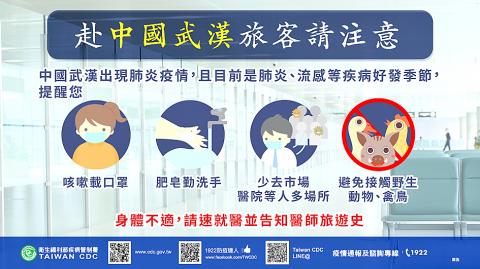The Centers for Disease Control (CDC) yesterday said that preliminary tests have excluded flu, avian flu or adenovirus infections as possible causes of a pneumonia outbreak in Wuhan, China, that was first reported last week.
After a rumor spread online on Tuesday last week about a SARS-like infection in Wuhan, the CDC on Tuesday announced that while information from the Chinese government suggests that the disease does not resemble SARS, enhanced preventive measures would take effect immediately.
CDC officials are boarding all flights from Wuhan to Taiwan — 12 flights per week — to check whether passengers or crew have symptoms indicating a possible case of the disease, the agency said.

Photo courtesy of the Centers for Disease Control
CDC Deputy Director-General Chuang Jen-hsiang (莊人祥) said that the Chinese government has excluded flu, avian flu and adenovirus as possible causes, but it had not ruled out other novel viruses, such as a coronavirus.
“Coronaviruses can cause mild symptoms, similar to a common cold, but they can also cause serious symptoms, such as SARS or MERS [Middle East respiratory syndrome],” Chuang said, adding that it is also important to find the source of the infection.
Chinese government information showed that there was no apparent evidence of human-to-human transmission, but the source of infection, the transmission route and whether there are communal outbreaks would be key points for the CDC to follow up on, and the factors will affect the centers’ risk evaluation, he said.
Since Tuesday last week, seven flights from Wuhan to Taiwan with a combined 633 passengers and crew had been inspected by airport quarantine officials, with six passengers showing mild symptoms, Chuang said.
One of the cases was confirmed as the flu, one a flu-like illness, one a common cold and another had a reduced fever, while local heath departments are following up on the two other cases, he said.
The CDC has issued a notice to healthcare professionals, urging them to be alert when treating people for pneumonia and to check whether they have traveled to Wuhan recently, he said, adding that they should report suspected cases and send a specimen for tests.
Forty-four people had been diagnosed with the illness as of Friday, with 11 in a critical condition, Chinese government data showed.
A total of 121 people who have had direct contact with patients are being observed, the data showed.
The CDC said that people planning to visit Wuhan and nearby areas should wash their hands frequently with soap, wear a surgical mask, avoid livestock markets, hospitals and crowded areas, and report to the airport quarantine station if they have a fever or flu-like symptoms when returning to Taiwan.

MORE VISITORS: The Tourism Administration said that it is seeing positive prospects in its efforts to expand the tourism market in North America and Europe Taiwan has been ranked as the cheapest place in the world to travel to this year, based on a list recommended by NerdWallet. The San Francisco-based personal finance company said that Taiwan topped the list of 16 nations it chose for budget travelers because US tourists do not need visas and travelers can easily have a good meal for less than US$10. A bus ride in Taipei costs just under US$0.50, while subway rides start at US$0.60, the firm said, adding that public transportation in Taiwan is easy to navigate. The firm also called Taiwan a “food lover’s paradise,” citing inexpensive breakfast stalls

TRADE: A mandatory declaration of origin for manufactured goods bound for the US is to take effect on May 7 to block China from exploiting Taiwan’s trade channels All products manufactured in Taiwan and exported to the US must include a signed declaration of origin starting on May 7, the Bureau of Foreign Trade announced yesterday. US President Donald Trump on April 2 imposed a 32 percent tariff on imports from Taiwan, but one week later announced a 90-day pause on its implementation. However, a universal 10 percent tariff was immediately applied to most imports from around the world. On April 12, the Trump administration further exempted computers, smartphones and semiconductors from the new tariffs. In response, President William Lai’s (賴清德) administration has introduced a series of countermeasures to support affected

CROSS-STRAIT: The vast majority of Taiwanese support maintaining the ‘status quo,’ while concern is rising about Beijing’s influence operations More than eight out of 10 Taiwanese reject Beijing’s “one country, two systems” framework for cross-strait relations, according to a survey released by the Mainland Affairs Council (MAC) on Thursday. The MAC’s latest quarterly survey found that 84.4 percent of respondents opposed Beijing’s “one country, two systems” formula for handling cross-strait relations — a figure consistent with past polling. Over the past three years, opposition to the framework has remained high, ranging from a low of 83.6 percent in April 2023 to a peak of 89.6 percent in April last year. In the most recent poll, 82.5 percent also rejected China’s

PLUGGING HOLES: The amendments would bring the legislation in line with systems found in other countries such as Japan and the US, Legislator Chen Kuan-ting said Democratic Progressive Party (DPP) Legislator Chen Kuan-ting (陳冠廷) has proposed amending national security legislation amid a spate of espionage cases. Potential gaps in security vetting procedures for personnel with access to sensitive information prompted him to propose the amendments, which would introduce changes to Article 14 of the Classified National Security Information Protection Act (國家機密保護法), Chen said yesterday. The proposal, which aims to enhance interagency vetting procedures and reduce the risk of classified information leaks, would establish a comprehensive security clearance system in Taiwan, he said. The amendment would require character and loyalty checks for civil servants and intelligence personnel prior to